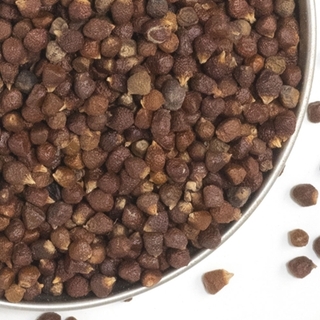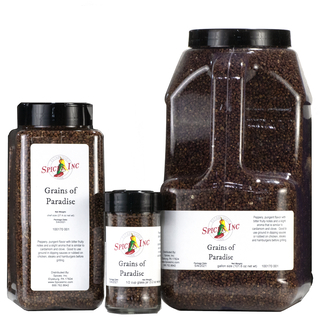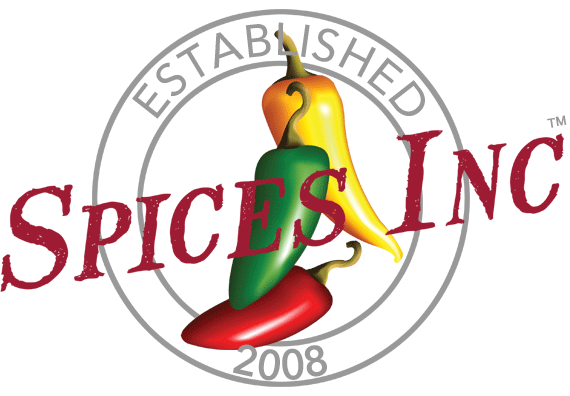Grains of Paradise




Grains of Paradise
Grains of Paradise, Aframomum melegueta, is also called alligator pepper, paradise pepper, or grain of paradise.
Grains of Paradise has an essential oil of .5% - 1.0%.
What Is Grains of Paradise
Grains of Paradise is a member of the Zingiberaceae family (the ginger family) and is closely related to Cardamom, Galangal, Ginger, and Turmeric. These pyramid-shaped whole seeds are reddish brown and turn to a dull Grey when ground.
Native to Africa's West coast, namely the countries Ghana, Liberia, Togo and Nigeria, Grains of Paradise had long been used in Middle Eastern, North and West African cuisines. This spice was used in European beer and winemaking until the 19th century.
Grains of Paradise is also known as Melegueta pepper but should not to be confused with Malagueta Chile, Capsicum frutescens, which is a South American chile pepper. While Grains of Paradise is often referred to as Alligator pepper, Aframomum danielli, A. citratum or A. exscapum, that is not accurate as Alligator Pepper, while being a close relative to Grains of Paradise, is not the same thing.
Grains of Paradise is mostly used by trailblazing chefs, craft brewers, and distillers.
History of Grains of Paradise
Pliny the Elder (23-79AD), the Roman author of the celebrated Natural History, referred to it as African pepper and he wrote of Hippocras a wine flavored with Cinnamon, Ginger, and Grains of Paradise. In the Middle Ages (400-1400AD) this spice was termed "grana paradisi" meaning "grains of paradise" due to its high value. This name has religious connotations to the medieval conception of an "earthly paradise" full of the aroma of spices. In Hebrew the Biblical term "Eden" is used in describing this spice "gargeri gan ha-eden" which translates to "grains from the Garden of Eden".
In 1214 AD, Grains of Paradise was listed on medical prescriptions from physicians in places ranging from Nicosia (the largest city on the island of Cyprus), Lyons (in modern day France), Rome and Wales (in modern day Great Britain).
The common name “Melegueta” derives from the Melle empire (1235 to 1670) and began in a small Mandinka kingdom at the upper reaches of the Niger River situated between Mauritania and Sudan. The Portuguese would come to call it Terra de Malaguet.
In 1469, King Afonso V of Portugal granted Ferno Gomes, a Lisbon merchant and explorer, a monopoly of trade in the Gulf of Guinea. This allowed Gomes to control the market, on what he called guinea pepper, being imported into Europe (primarily into France, Italy and Portugal) as a popular, less expensive substitution for black peppercorns from the east. The Grains of Paradise trade became so strong that the African coastline just north of the Ivory Coast became known as the Grain Coast. In 1498, the sea route from Europe to the Indian Ocean, around the Cape of Good Hope, was pioneered by the Portuguese explorer Vasco da Gama. This made the East and its wealth of spices, including black peppercorns, less expensive and more readily available. With this development the European market for Grains of Paradise essentially disappeared.
Queen Elizabeth I of England (who ruled from 1558-1603) was said to flavor her Beer with Grains of Paradise. Sam Adams brewery founder Jim Koch added Grains of Paradise to his original Summer Ale beer in 1996.
Grains of Paradise Cultivation
Grains of Paradise is a herbaceous perennial plant that is native to swampy habitats along the West African coast. Each plant can bear fruit for up to 10 years. Grown from a rhizome (a modified subterranean plant stem that sends out roots and shoots from its nodes), Grains of Paradise is a tropical reed-like plant that reaches a height of 3-5 feet. With bamboo looking leaves that are 10" long and 1" wide, they are simple, alternate and taper to a point at the apex. The plant's purple colored flowers develop into pear-shaped reddish-brown pods that grow no more than 3" long. The fruits are fleshy, indehiscent (seeds remain trapped inside when the fruits fall to the ground), and produce spikes. The pod, which looks like a tough leathery husk, will contain between to 1,200 to 2,000 seeds in a white jelly-like pulp. The pods mature from green to yellow and red.
The fruits are harvested at maturity when the pod ripens to yellow or red at the foot of the plant. The pods are harvested by cutting the stem of the fruit close to the rhizome being careful to keep the sepals in place. The pods are placed on a raised platform to dry for 7-10 days. During this drying process rotten fruits are removed. Once this initially drying period is complete a knife is used to cut open the pods and extract the seeds. The seeds are winnowed to remove the chaff and then laid on a tarp to dry in the sun. Once completely dried, they are tightly wrapped and sold.
Grains of Paradise is mostly grown in Ghana, Guinea, and Nigeria, and Sierra Leone. They are also grown on a smaller scale in the US, India and in the Caribbean, where they were brought in the 1800's on slave ships from West Africa.
Grains of Paradise is mostly grown in Ghana, Guinea, Nigeria, and Sierra Leone.
Where Is Our Grains of Paradise From
Depending on the time of year our Grains of Paradise may come from Ghana, Nigeria or the US.
What Does Grains of Paradise Taste Like
A peppery, pungent flavor with bitter fruity notes and a slight aroma that is similar to cardamom and clove.
What Is Grains of Paradise Good For
Grains of Paradise are among several flavorful spices, along with Long Pepper and Cubeb Berries, from West Africa, where spices are ground and combined in complex blends. In Tunisia, Grains of Paradise is used to add flavor to vegetable dishes (especially eggplant). Add to lentils when making mujaddara, and use as a finishing flavor for traditional African peanut soup. Grains of Paradise adds a brisk snap to sweet vegetables, like kabocha squash or sweet potatoes. In Europe they were historically used to spice beer and wine and more recently liqueurs and vinegars.
You can use Ground Grains of Paradise almost like a finishing salt and add right before a meal is served (by sprinkling on top). Grains of Paradise works really well in this manner especially on steamed fish or steamed vegetables. We've also used Grains of Paradise in a variety of rice dishes.
There is probably no recipe in which Grains of Paradise can not be substituted for black pepper. Like peppercorns, they can be crushed in a mortar and pestle or ground in a pepper mill. Grains of Paradise is often used in larger quantities than pepper when cooking.
We always recommend starting off using less than more when using a new spice or seasoning for the first time so that it doesn't overpower your dish. You can always add more.
Grains of Paradise is used to flavor chicken, couscous, fish, grilled lamb, okra, pickling mixtures, pumpkin, rice, soups and stews. In this country it's gaining popularity when ground into dipping sauces or rubbed on chicken, steaks and hamburgers before grilling.
Grains of Paradise pairs well with black pepper, cinnamon, coriander, clove, cumin and ginger.
What Is a Substitute for Grains of Paradise
We have heard of substitutes for Grains of Paradise being ground black pepper, cardamom or sansho pepper (typically 1 part Grains of Paradise equaling 1/2 part of one of these). We feel for a more complete flavor that you should substitute 1 part Grains of Paradise with 1/2 part Ground Black Pepper and 1/4 part each of cardamom and ginger.
| Ingredients | grains of paradise |
| Also Called | Alligator pepper, paradise pepper, or grain of paradise |
| Recommended Uses | Add to chicken, couscous, fish, grilled lamb, okra, pickling mixtures, pumpkin, rice, dipping sauces, soups and stews |
| Flavor Profile | A peppery, pungent flavor with bitter fruity notes |
| Oil Content | .5% - 1.0% |
| Botanical Name | Aframomum melegueta |
| Cuisine | African and Mediterranean |
| How To Store | Airtight container in a cool, dark place |
| Shelf Life | 1-2 years |
| Country of Origin | Nigeria |
| Dietary Preferences | Gluten Free, Kosher, Non-GMO |
Hungry for More Information
African Spices and Seasonings
The Culinary Regions of African Cuisine
What Is Curry
Craft Brewers' Favorite Beer Spices
Nutrition Facts
Serving Size1 tsp
Amount Per Serving
Calories12
% Daily Value*
Total Fat0g0%
Saturated Fat0g0%
Trans Fat0g
Polyunsaturated Fat0g
Monounsaturated Fat0g
Cholesterol0mg0%
Sodium0.9mg0%
Total Carbohydrate2.5g1%
Dietary Fiber0.5g2%
Total Sugars0.1g
Added Sugars0g0%
Sugar Alcohol0.0g
Protein0.3g0%
Vitamin D0mcg0%
Calcium4mg0%
Iron1mg4%
Potassium46mg1%
*The % Daily Value (DV) tells you how much a nutrient in a serving of food contributes to a daily diet. 2,000 calories a day is used for general nutrition advice. These values were calculated and therefore are approximate. For more accuracy, testing is advised.
